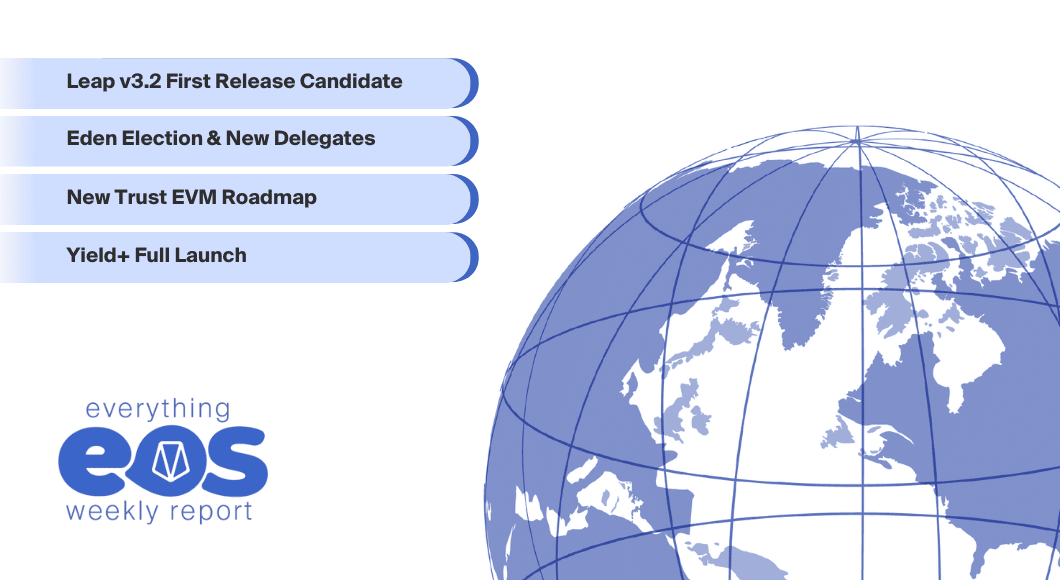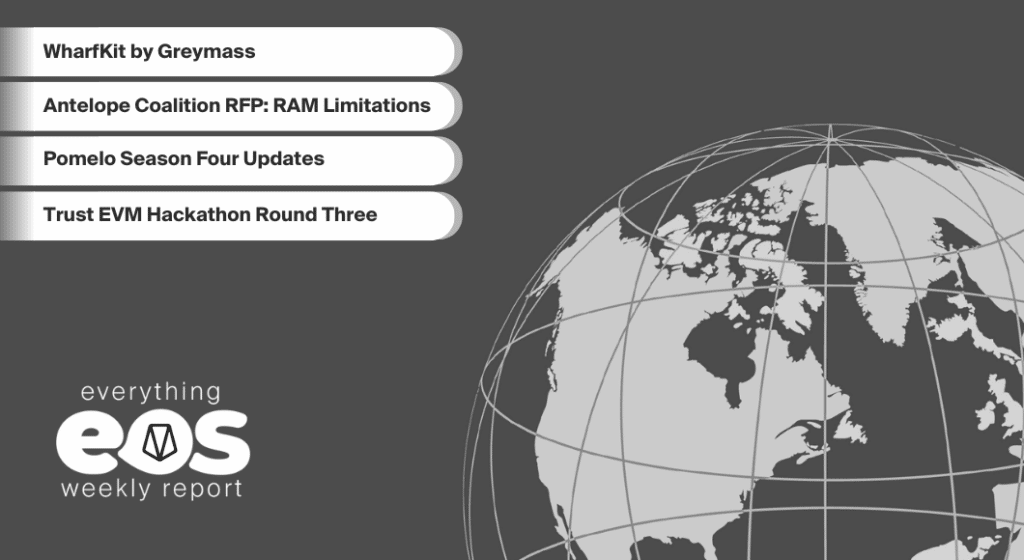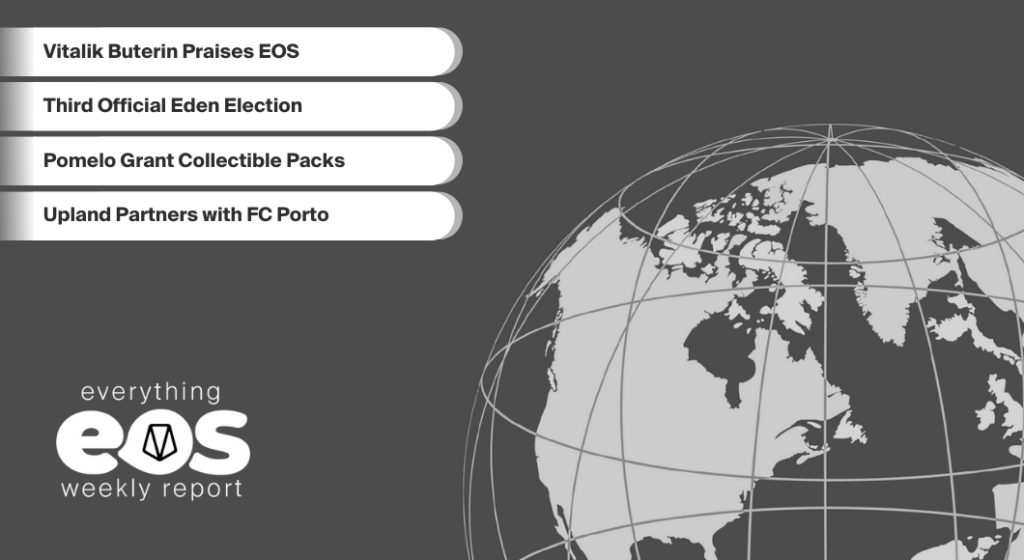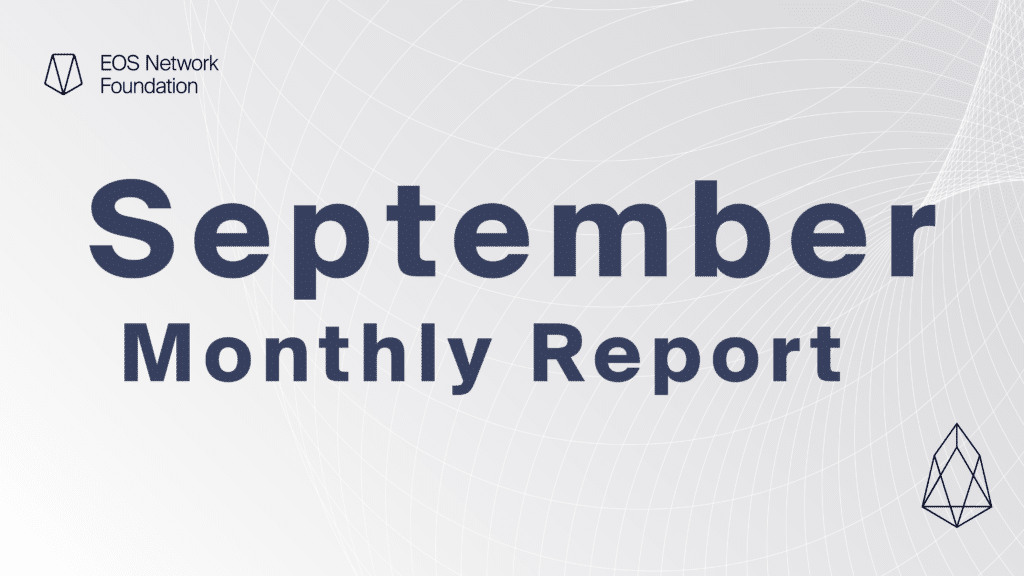The Everything EOS Weekly Report publishes all of the latest news and updates from around the world in the EOS ecosystem. The Everything EOS Weekly Report sources stories and updates from community members that are part of the English, Chinese, & Korean EOS communities. The Everything EOS Weekly Report is the best place to catch up on all the latest news in EOS from all around the world.
EOS Returns to the Conference Circuit
September was full of huge developments for the EOS Network, bringing hard-won code independence and a long-awaited return to the blockchain conference circuit!
The ENF’s outreach partner, Zaisan, is implementing the first stage of the ENF Global Conference Strategy, and handles all conference logistics including marketing materials, booth design and setups, staffing of events, securing speaking engagements, and following up on business development leads.
This framework is meant to serve as a model that will allow the ENF to expand the EOS Network further with other teams in Asia, Africa, South America, Oceania. North America, where most of the ENF team is based, will receive strong coverage from the core team as well as support from additional partners as they move forward.
Eden Election and the New Eden Delegates
The quarterly Eden election arrived on October 8, culminating in the election of five new chief delegates. Previous Eden delegates Chris Barnes and Jesse Jaffe joined Helios’s Chris Waxa, former HyphaDAO and current ReGen Civics team member Rieki Cordon, and EOS Costa Rica’s Xavier Fernandez on the roster of chief delegates.
Eden awards each chief delegate a portion of the treasury monthly to use for ecosystem development or other public goods on EOS. Members decided the winners in a scheduled consensus tournament last Saturday.
In this tournament, participants met with three to five other randomly selected members on a video conference call. With a >⅔ consensus, they decided on one representative to move on to the next round as a level 1 delegate.
Round one winners included twenty of the most active and engaged members of the EOS community, including members of Helios, NovaCrypto, EOS Bees, Block Producers, and passionate community advocates across the English-speaking world.
After the first round, all level one delegates met again in randomly selected groups to decide on the next level delegation.
This process continued until only 4-6 members remained, at which point members of this group became the Eden chief delegates.
Each level 1 delegate received 493 EOS for the first month, while chief delegates received 2220 EOS in their first month on top of their level 1 delegate reward. Future rewards are calculated based on the remaining Eden treasury.
Other languages have versions of the Eden process aligned with creating value for EOS, like EdenCN for Chinese and Eden Korea for Korean. Additional tools from HyphaDAO enable deployment by other communities around the world.
If you’re not an Eden member, consider joining! Any Eden member can invite you. If you’re having trouble finding Eden members who can induct you, consider participating in the weekly Eden fractal meeting Wednesdays at 14:00 UTC, which is open to all. Many of the most active Eden members attend.
Antelope Leap v3.2 First Release Candidate
Antelope Protocol developers shared the first release candidate for a new Leap v3.2 software upgrade on October 7, fresh off the heels of the smaller Leap v3.1.2 release.
Like other v3.1.X changes, the smaller release includes bug fixes, including a fix for replaying block logs.
Leap v3.2 is a much more comprehensive release. It includes new and updated applications, new options, new benchmarks and logs, and improved stability and performance.
The new version features a unified command-line application called leap-util. This tool includes functions useful for node operators but inappropriate to include in existing cleos or nodeos tooling.
This release candidate also includes updates to the cleos command-line tool, including many new options and several new compatibility improvements and convenience features.
Leap v3.2 additionally offers the option for the http_plugin to limit concurrent requests, to reduce the effect of HTTP requests on node performance. It also allows nodes to use the three-strikes rate limit rule on speculative blocks rather than only on the BP node.
The new release also improves block log options like –extract-blocks, which extracts blocks in a certain range, and adds the ability to run a node without a block log. It also includes a framework that allows developers to create benchmarks for their software.
New data and logging improvements offer more detailed resource usage reports and data logging fields. The new Leap version also offers stability improvements and performance optimizations that propel it further into the cutting edge of blockchain technology.
New Trust EVM Roadmap
TrustEVM released its new product roadmap this week, revised after identifying opportunities for improvements to product architecture and block times.
The TrustEVM is the first Ethereum Virtual Machine (EVM) to offer the high performance and uptime of the EOS blockchain with full Ethereum ecosystem compatibility, including Metamask, RPC endpoints and solidity libraries. Initial testing indicates an average latency of under three seconds and a conservative estimate of over 600 swaps per second. And TrustEVM is built on a blockchain that has experienced no downtime or block reorganizations after four years of battle-testing.
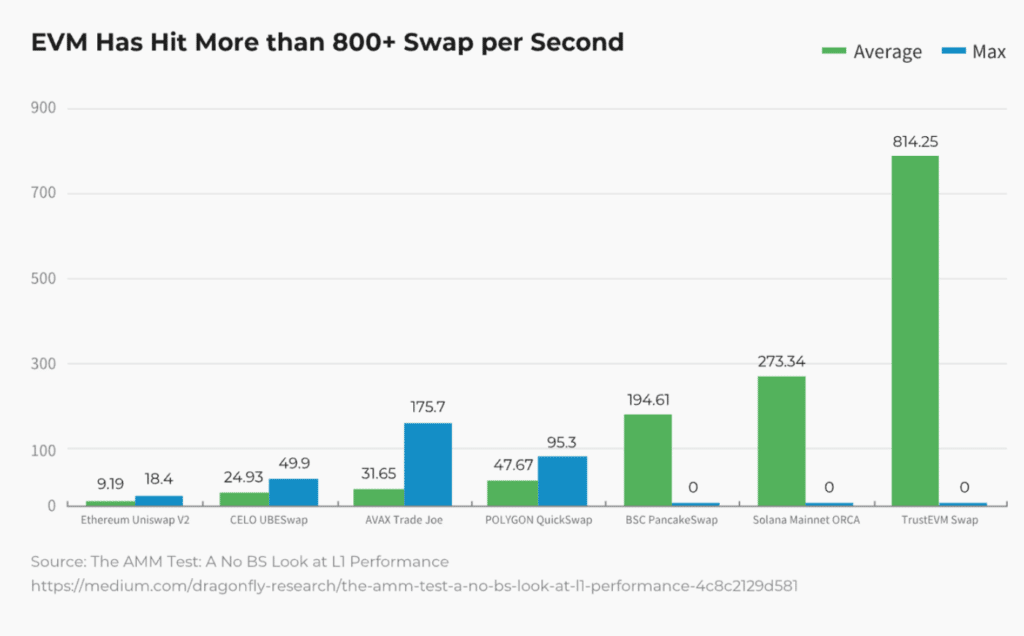
TrustEVM is already impressively performant, easily doubling the number of swaps per second compared to its closest competitor. The new roadmap will allow developers to decrease the latency from its current 2-3 seconds, and the new architecture will avoid issues with the imprecise block times of the Ethereum blockchain. The EVM team expects to have a v2 testnet ready for release in December 2022, with a mainnet launch likely in Q1 of 2023. Further improvements will follow through Q2.
Pomelo NFT Moon Rock Sale is Live
EOS’s favourite seasonal public goods extravaganza is back with its NFT series, and on October 11, they released the first NFT of Season 4, Moon Rocks. Last season, 1000 unique astronauts blasted off to the moon in their rocket ships, and this season participants can get the materials their astronauts need to build on the moon. Support the expansion of the Pomelo intergalactic adventure and buy yourself some Moon Rocks.
Pomelo participants have great ambitions but require resources to achieve them. Thankfully the Pomelo ecosystem provides those resources to those chosen by the community. Participating in this NFT series helps all Pomelo builders who contribute public goods for the EOS network and the Antelope ecosystem.
Pomelo is an open-source crowdfunding platform inspired by Gitcoin to fund EOS-based projects using a quadratic mechanism to multiply community contributions. Quadratic Funding (QF) has proven to be the mathematically optimal way to fund public goods in a community. It gives greater weight to the number of unique contributors. With the magic of quadratic funding, more funds go to grants with more unique donors.
Pomelo has raised a cumulative total of $2,197,678 for public goods in its first three seasons. The enthusiasm and appreciation among the community for Pomelo demonstrates the power of quadratic funding. Pomelo has empowered the community to bootstrap initiatives like HyphaDAO, EOS Support, EOS Bees, and hundreds of others.
You can purchase Moon Rocks for 2.2 EOS each. As in previous seasons, collectors will have multiple opportunities to blend these Moon Rocks into a plethora of exciting and unique treasures in the season to come.
Next, on October 18, the Grant Collectible pack drops at 9 EOS per pack, with 3 Grant Collectibles per pack. These collectible digital cards showcase some of the most successful grants from the previous season, and participants can blend them with Moon Rocks to make Robot Potions. The remainder of the Pomelo season will reveal what other exciting advancements our Pomelo NFT journey will bring!
Yield + Full Launch
Yield+ enters the next stage of its deployment with an increase in token rewards with its full launch on October 17. The full launch for Yield+ will increase the reward subsidies for EOS and native USDT from 1% to 5% for DeFi protocols enrolled in the program. This full launch will provide 5x the incentives for protocols and end users to lock up their tokens and put them to work in EOS DeFi.
Yield+ and the DeFi onboarding it enables are beneficial across the ecosystem. Many benefits surround increasing the amount of EOS-based USDT locked in DeFi liquidity pools, such as enabling exchanges to participate on-chain or allowing arbitrage traders to offer better price stability. EOS token holders and other crypto users will all benefit from EOSUSDT, as it is likely to be the cheapest option for sending USDT on-chain.
EOS ecosystem engineers developed Yield+ after months of research (outlined in the Yield+ Blue Paper) to increase TVL on EOS. It takes inspiration from stable and reliable incentive programs on other protocols. Yield+ intends to attract DeFi applications so EOS users can use their tokens to generate reliable yield across multiple DeFi protocols. This initiative incentivizes increased TVL and breathes new life into DeFi on EOS.
Weekly EOS Community Events & Upcoming Conferences
As always, we host Fireside Chats in the EOS Community Discord every Wednesday at 19:00 UTC. Everyone is welcome to attend and ask questions directly to some of the best builders in EOS. We look forward to seeing you there!
This month the EOS community will have a presence at the following conferences:
- Blockchain Expo, Zaragoza, Spain, October 26-27 (Wed – Thu)
The EOS community also hosts many online events that anyone can join every week:
- Eden ƒractal, Wednesdays 13 UTC on Zoom (Discord, Twitter)
- Helios Futurist Series, Wednesdays 14 UTC on Twitter Spaces, (Twitter, Website)
- EOS Fireside Chat, Wednesdays 19 UTC on Discord (Youtube, Short Clips)
- EOS Support Giveaway Show, Thursdays 16 UTC on Twitter Spaces (Twitter, Website)
- Hot Sauce, Fridays 16 UTC on YouTube (YouTube, Twitter)
- Helios Blockchain & Breakfast, Fridays 17 UTC on Twitter Spaces (Twitter, Website)
- Eden Town Hall, Sundays 16 UTC on Zoom (Discord, Youtube)
EOS Network
The EOS Network is a 3rd generation blockchain platform powered by the EOS VM, a low-latency, highly performant, and extensible WebAssembly engine for deterministic execution of near feeless transactions; purpose-built for enabling optimal web3 user and developer experiences. EOS is the flagship blockchain and financial center of the Antelope protocol, serving as the driving force behind multi-chain collaboration and public goods funding for tools and infrastructure through the EOS Network Foundation (ENF).
EOS Network Foundation
The EOS Network Foundation (ENF) is a not-for-profit organization that coordinates financial and non-financial support to encourage the growth and development of the EOS Network. The ENF is the hub of the EOS Network, harnessing the power of decentralization as a force for positive global change to chart a coordinated future for EOS.
